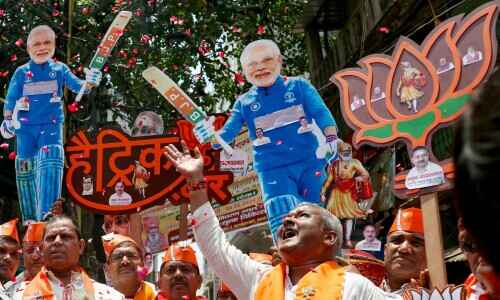In an effort to increase the likelihood that Indian Prime Minister Narendra Modi will serve a record-tying third term in office, a significant ally of his promised support to him on Wednesday. Modi was also scheduled to attend a meeting to discuss creating a coalition administration.
In an unexpected election result on Tuesday, Modi’s Hindu nationalist Bharatiya Janata Party (BJP) lost its absolute majority in parliament. In order to form a government, he would need the backing of allies in the National Democratic Alliance (NDA).
According to official results released late on Tuesday, the BJP won 240 seats in the general election on its own, 32 seats shy of the halfway point in the 543-member lower house of representatives.
The alliance’s southern member, Andhra Pradesh, the Telugu Desam Party (TDP), declared on Wednesday that it was completely in support of Modi and his party.
The TDP leader, Chandrababu Naidu, told reporters, “We are with the NDA; I will be attending the meeting in Delhi today.”
Investors were alarmed and worried about the government’s reform plan as the BJP was held back to 240 seats on its own while the NDA gained 293 seats in the house, more than the 272 seats required to form a government. The remaining NDA seats were won by other allies, leaving the TDP with 16 seats.
The most ambitious components of the government’s reform agenda may face difficulties due to the decreased majority for Modi’s alliance, according to ratings agency Fitch.
“We do expect broad policy continuity to persist, with the government retaining its focus on its capex push, ease of doing business measures, and gradual fiscal consolidation,” the statement continued, despite the reduced majority.
The results of the election alarmed investors, causing equities to plummet sharply on Tuesday because Modi would be dependent on a variety of regional groups whose allegiances have changed over time.
The Indian Express’s header headline, “India gives NDA a third term, Modi a message,” suggested that Modi’s halo had faded.
Modi’s personal win in Varanasi, one of the holiest towns in Hinduism, was muted; in the most recent general election in 2019, his margin of victory shrank from nearly 500,000 to just over 150.000 votes.
However, Arvind Panagariya, the chairman of a government finance council, stated in an editorial in the Economic Times newspaper that this diminished victory might not always equate to reform stagnation.
It is still completely possible to implement the required reforms in parliament, even with the smaller majority. “The government’s hand can only get stronger in the upcoming years if sustained growth is delivered at [an] accelerated pace,” he stated.
More than expected, the opposition INDIA alliance led by Rahul Gandhi’s centrist Congress party gained 230 seats. Congress alone garnered 99 votes, about twice as many as it did in 2019 (52). This unexpected increase is anticipated to elevate Gandhi’s stature.
It was also anticipated that the INDIA alliance would convene on Wednesday in New Delhi to decide on a future plan of action.
However, the opposition’s attempts to form a government were probably dashed when two of the BJP’s most important allies backed Modi and declared that their pre-election alliance remained intact.
In front of an enthusiastic assembly of party employees at the party headquarters late on Tuesday night, Modi pledged to put in more effort during his third term. “After ten years, the people’s blessings for the third time raise our spirits and give us new strength,” he remarked.








